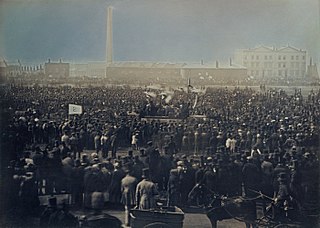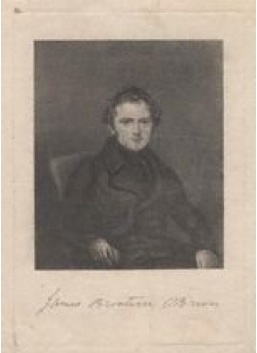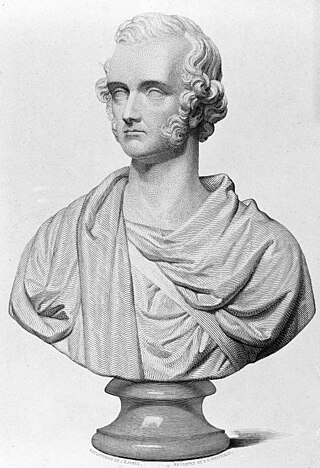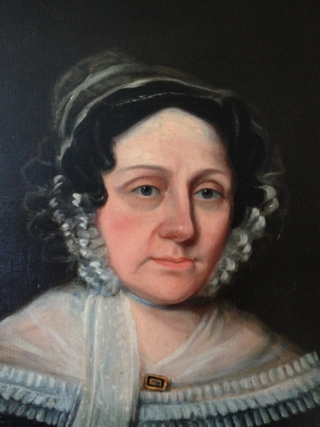
Chartism was a working-class movement for political reform in the United Kingdom that erupted from 1838 to 1857 and was strongest in 1839, 1842 and 1848. It took its name from the People's Charter of 1838 and was a national protest movement, with particular strongholds of support in Northern England, the East Midlands, the Staffordshire Potteries, the Black Country and the South Wales Valleys, where working people depended on single industries and were subject to wild swings in economic activity. Chartism was less strong in places, such as Bristol, that had more diversified economies. The movement was fiercely opposed by government authorities, who finally suppressed it.

Kensal Green Cemetery is a cemetery in the Kensal Green area of North Kensington in the Royal Borough of Kensington and Chelsea and the London Borough of Hammersmith and Fulham in London, England. Inspired by Père Lachaise Cemetery in Paris, it was founded by the barrister George Frederick Carden. The cemetery opened in 1833 and comprises 72 acres (29 ha) of grounds, including two conservation areas, adjoining a canal. The cemetery is home to at least 33 species of bird and other wildlife. This distinctive cemetery has memorials ranging from large mausoleums housing the rich and famous to many distinctive smaller graves and includes special areas dedicated to the very young. It has three chapels and serves all faiths. It is one of the Magnificent Seven cemeteries in London.

Feargus Edward O'Connor was an Irish Chartist leader and advocate of the Land Plan, which sought to provide smallholdings for the labouring classes. A highly charismatic figure, O'Connor was admired for his energy and oratory, but was criticised for alleged egotism. His newspaper Northern Star (1837–1852) was widely read among workers, becoming the voice of the Chartist movement.

Francis Place was an English social reformer described as "a ubiquitous figure in the machinery of radical London."

Thomas Cooper was an English poet and a leading Chartist. His prison rhyme the Purgatory of Suicides (1845) runs to 944 stanzas. He also wrote novels and in later life religious texts. He was self-educated and worked as a shoemaker, then a preacher, a schoolmaster and a journalist, before taking up Chartism in 1840. He was seen as a passionate, determined and fiery man.

Richard Carlile was an important agitator for the establishment of universal suffrage and freedom of the press in the United Kingdom.

William Lovett was a British activist and leader of the Chartist political movement. He was one of the leading London-based artisan radicals of his generation.

James Bronterre O'Brien was an Irish Chartist leader, reformer and journalist.

Henry Hetherington was an English printer, bookseller, publisher and newspaper proprietor who campaigned for social justice, a free press, universal suffrage and religious freethought. Together with his close associates, William Lovett, John Cleave and James Watson, he was a leading member of numerous co-operative and radical groups, including the Owenite British Association for the Promotion of Co-operative Knowledge, the National Union of the Working Classes and the London Working Men's Association. As proprietor of The Poor Man's Guardian he played a major role in the "War of the Unstamped" and was imprisoned three times for refusing to pay newspaper stamp duty. He was a leader of the "moral force" wing of the Chartist movement and a supporter of pro-democracy movements in other countries. His name is included on the Reformers' Memorial in Kensal Green Cemetery.

William Ward (1769–1823) was an English pioneer Baptist missionary, author, printer and translator.
John Cleave was a British, London based Chartist leader, a printer and newspaper publisher.
Richard Spurr (1800–1855) was a Cornish cabinet maker and lay preacher who was imprisoned for his part in leading the political movement Chartism.

Sir James Alderson FRS was an English physician born and based in Kingston upon Hull. He was President of the Royal College of Physicians.

Lloyd Jones was an Irish socialist and union activist, advocate of co-operation, journalist and writer.
The Rotunda radicals, known at the time as Rotundists or Rotundanists, were a diverse group of social, political and religious radical reformers who gathered around the Blackfriars Rotunda, London, between 1830 and 1832, while it was under the management of Richard Carlile. During this period almost every well-known radical in London spoke there at meetings which were often rowdy. The Home Office regarded the Rotunda as a centre of violence, sedition and blasphemy, and regularly spied on its meetings.
Elijah Dixon was a textile worker, businessman, and agitator for social and political reform from Newton Heath, Manchester, England. He was prominent in the 19th century Reform movement in industrial Lancashire, and an associate of some of its leading figures, including Ernest Jones, and his obituary claims that he was called "the Father of English Reformers". His activism led to arrest and detention for suspected high treason, alongside some other leading figures of the movement, and he was present at key events including the Blanketeers' March and the Peterloo massacre. In later life he became a successful and wealthy manufacturer. He was the uncle of William Hepworth Dixon.

Henry Stebbing FRS (1799–1883) was an English cleric and man of letters, known as a poet, preacher, and historian. He worked as a literary editor, of books and periodicals.
George Lipscomb (1773–1846) was an English physician and antiquarian, known particularly for his county history of Buckinghamshire.
Richard Moore (1810–1878) was an English radical politician. He was a moderate Chartist, and heavily involved in the campaign against "taxes on knowledge".

Alice Mann was a Leeds-born radical and publisher. Her husband was arrested on suspicion of involvement in an armed uprising and she served a week long and a six month sentence for selling newspapers without paying the required tax.














